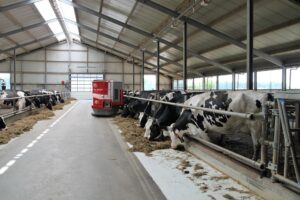Agriculture is increasingly facing more environmental pressure from regulators, activist groups, and private citizens. In some cases, it is the farmers bringing legal action against an entity that has affected their farm.
Below, we very briefly share some recent Agricultural-Environmental items in the news.
Dairy Farmer Sues Airport over PFAS Contamination
A Burlington, Vermont dairy farmer is suing the City (of Burlington) for contaminating his 400-cow dairy farm with per and polyfluoroalkyl substances (PFAS). The farmer alleges that the firefighting foam used by the Vermont National Guard (The “Guard”), who leases a portion of the airport property, migrated on to his property. The PFAS has affected his groundwater and a stream on this property.
The Guard have acknowledged that the firefighting foam has contaminated the groundwater on the base. It is unknown how far the contamination has migrated off site. State regulators say the PFAS plume has reached nearby Winooski River.
For their part, The Guard have replaced their firefighting foam to options that appear to be less toxic than PFAS. They also installed a filter on the farmers well (in 2017).
No additional information regarding negotiations was provided (See Dairy Farmer Sues Burlington Over Airport PFAS Contamination).
Michigan Farm Fined $120,000
What began as a citizen complaint ended with a lawsuit filed by Michigan’s Department of Environment Great Lakes and Energy (EGLE) against a Concentrated Animal Feeding Operation or CAFO in Michigan. The CAFO was fined $120.000. Allen and Aaron Slater own the farm in Muskegon, Michigan, where they manage about 1,500 dairy cows.
According to EGLE, the suit stemmed from failures in the past. EGLE states that the farm, “failed adherence to a prior administrative settlement with Slater Farms, in which the entity was found in 2012 to be operating a CAFO without a permit and then, after securing one, continuously violated it by improperly managing the vast amounts of animal waste produced by its feeding operations.”
In September, Attorney General, Dana Nessel’s office said, “The farm improperly managed huge quantities of liquid manure, ignored state violation notices and disregarded other requirements of the CAFO permit.”
The Attorney General went on to say, “It’s long past time CAFOs like Slater Farms start adhering to additional oversight and permit measures instead of using our clean water as their own personal sewer …the future of our environment depends on it.”
Under the terms of the consent order, Mr. Slater can avoid paying $60,000 of the fine if they remain in compliance for the next year.

Farmers are facing increased “environmental pressure” from regulators and activists (Image by annigje from Pixabay).
Remotely Sensing CAFO Violations
Large farms may be under additional watchful eyes by way of remote sensing. This, according to a pre-print of an article in “International Journal of Applied Earth Observation and Geoinformation, the authors’ state, “Advances in remote sensing and computer vision… have the potential to augment compliance monitoring by detecting early warning signs of noncompliance.”
They also state, “We demonstrate a process for rapid identification of significant structural expansion using Planet’s 3 m/pixel satellite imagery products and focusing on Concentrated Animal Feeding Operations (CAFOs) in the US as a test case. Unpermitted building expansion has been a particular challenge with CAFOs, which pose significant health and environmental risks” (emphasis added).
The Biden Administration have provided every indication that they will focus on methane from the oil and gas industry. Using remote sensing, will they begin to monitor methane from CAFOs?
Sustainable Agriculture
We look forward to attending the upcoming 2021 Sustainable Agriculture Summit and Dairy Sustainability Alliance Meeting in Las Vegas where leaders in agriculture will discuss US agriculture’s role in implementing sustainable processes and practices to build a resource-positive future.
Agricultural Environmental Resources
We have worked on agricultural-related projects for around 30 years. With changing environmental policies and more enforcement, we added our “Agricultural-Environmental Resources” page a few years ago to help you keep a pulse on these issues. We add to this page periodically, so you might want to bookmark the page.
Resources:
U.S. Methane Emissions Reduction Action Plan (November 2021)
If you need immediate assistance with an agricultural-environmental issue, contact Jeffrey Bolin at 248-932-0228, Ext 125.
Feel free to connect with me on LinkedIn.
Sign up for our monthly newsletters.
Principled Foundation | Thoughtful Advice | Smart Solutions
